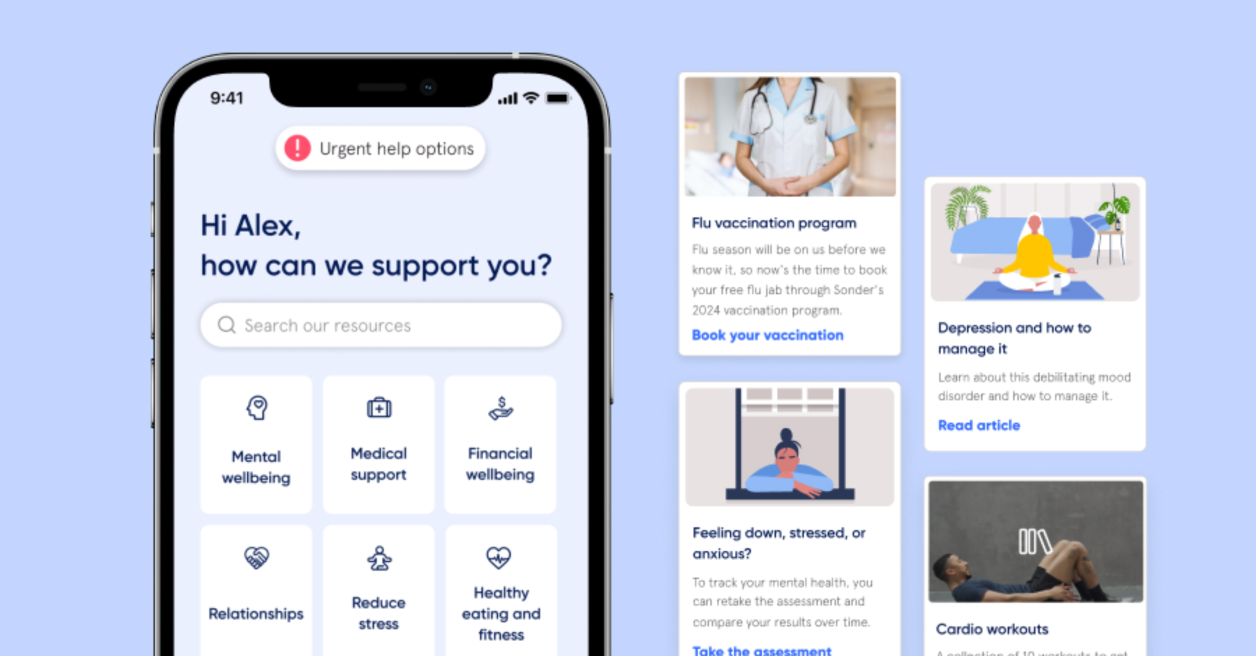New research from the Australian Healthcare Index 2024 reveals that increasing out-of-pocket costs and growing emergency department waiting times are just some of the biggest healthcare concerns impacting Australians – and preventing them from seeking help
This latest pulse check of Australia’s healthcare system (produced by Healthengine and the Australian Patients Association) surveyed 9,391 Australians across all states and territories to capture their healthcare perspectives and experiences in 2024.
With cost-of-living climbing and professional support harder to access, it’s no surprise that the top healthcare challenges faced by Australians are dominated by rising out-of-pocket costs and growing General Practice (GP) and Emergency Department (ED) waiting times.
Mental health also ranked as one of the top healthcare challenges, with nearly one-quarter (23%) of respondents describing their mental health as worse than six months ago. Not only are 51% of respondents waiting over three months to receive mental health support, but 26% of Australians say they’ve delayed seeking support due to the rising cost of living.
Concerningly, 20% of respondents say the first place they visit for non-emergency health concerns is Google, opening the door to potential inaccuracies in the healthcare advice Australians are receiving.

What are the top three health challenges faced by Australians?
The 2024 Australian Healthcare Index identified 12 key trends impacting the health and wellbeing of Australians. From the growing cost of prescription medication to challenges accessing GP appointments in rural and remote areas, affordability and accessibility proved to be key themes across this research.
Challenge 1. Access block for General Practice (GP) visits
By far, the biggest challenge identified in this report was the rising out-of-pocket costs for GP or doctor’s appointments.
49% of respondents say they’re visiting their GP less often, notably due to the rise in gap payments.
Certain groups of Australians are feeling the growing cost-of-care pinch more than others. More than half (57%) of 18 to 34-year-olds reported visiting their GP less often due to rising out-of-pocket costs.
But cost isn’t the only factor impacting GP visits, with poor availability of bookings, poor quality of care and long waiting times also named as key barriers to access.
Challenge 2. Emergency Department (ED) waiting times grow
Emergency departments are also feeling the strain of Australians turning to the ED as a way to access timely care.
48% of patients who visited the ED said that, on reflection, their concerns could have been managed by a GP instead. So, why are so many Australians visiting emergency rooms rather than their local doctor?
There are a number of reasons for this, including:
- 50% reported an inability to access out-of-hours care from their GP
- 29% said the wait times for a GP were proving too long
- 27% opted for the ED due to no out-of-pocket costs
Unfortunately, these unnecessary presentations to ED put further pressure on an already stretched health system, with long wait times and perceived inadequate staffing as the biggest sources of ED dissatisfaction.
While Urgent Care Clinics have been created to address this rise in unnecessary ED visits, a lack of awareness is reducing the uptake of these specialised health clinics.
Challenge 3. Clinician shortages, especially in regional areas
Finally, the third key challenge identified in this report was a rise in healthcare staffing shortages, particularly in remote and regional communities.
For regional respondents, GP, nurse and healthcare worker shortages were the top challenges identified in this research.
Plus, regional respondents named a number of additional healthcare challenges faced by Australians living outside metro areas, including:
- Regional respondents were admitted to public hospitals at a greater rate than their metro counterparts (37% vs. 30%).
- Regional respondents identified difficulties in booking appointments (47%) as the main reason not to recommend their GP.
How are these health challenges negatively impacting Australian businesses and employees?
The longer it takes for individuals to receive care, the longer it can take for employees to return to health. That’s why it’s so important for employers to take proactive steps to ensure healthcare is both accessible and affordable for their employees. And the more tailored and personalised it is, the better.
The healthcare challenges identified in this report pose a number of risks for employees and businesses alike, including:
- A drop in employee health and wellbeing: Poor physical health can have a direct impact on an employee’s mood, concentration levels and ability to live a full and rewarding life outside of the office. If left unchecked for extended periods of time, these medical concerns can become more serious and costly to treat, potentially extending an individual’s recovery timeline, too.
- A rise in absenteeism and presenteeism: If health concerns are left unaddressed, businesses may notice a rise in employees taking unexpected time off. Along with absenteeism, poor physical health can lead to increased presenteeism, with team members no longer meeting deadlines, collaborating effectively with team members or performing at their best
- A decline in productivity levels: At an organisational level, poor access to timely healthcare support can cause a ripple effect that can prevent teams from reaching their productivity and financial targets.
In dollar terms, presenteeism has been estimated to cost the Australian economy $34 billion a year through a loss of productivity. Some studiessuggest that presenteeism costs up to 1.7x an affected employee’s wage.
However, employers can play a powerful role in improving their team members’ access to healthcare and medical support. By rolling out access to an employee health advice service, employees can avoid the long waiting lists for GPs or the hefty out-of-pocket costs associated with a doctor’s visit.
In fact, the best providers will offer 24/7 medical advice for employees to reduce the potential impacts of ill health on staff and teams.
The role of telehealth in addressing healthcare challenges
Interestingly, this report pointed to a key solution to some of the biggest challenges being faced by Australians in 2024: telehealth.
Not only have 40% of Australians had a telehealth consult in the past 6 months, but 82% reported being extremely satisfied with their telehealth consultation.

Despite first rising to prominence in the pandemic as a stopgap measure to lockdowns and social distancing, telehealth continues to be a powerful tool to improve the accessibility of healthcare in Australia.
So, why do respondents choose telehealth? This research points to three key reasons:
- Convenience – 40%
- Not wanting to leave home – 20%
- Waiting too long for face-to-face GP appointments – 19%
How Sonder is helping to solve the top health challenges faced by Australians
Just like telehealth, Sonder’s digital care platform is transforming the way Australians access health, safety and medical support. Our 24/7 mobile app offers quick, easy access to personalised support for both employees and their family members, from personalised wellbeing resources to immediate healthcare assessments.

In practical terms, here’s how Sonder addresses the key healthcare challenges Australians are currently facing:
- 24/7 access to health, safety and medical support: Sonder connects employees with qualified health professionals in seconds.
- Free healthcare access for employees and their families: With this extended access to the Sonder platform, free of charge through their employer, it reduces barriers to access and improves uptake.
- After-hours support: Healthcare and medical issues aren’t limited to a 9-5 schedule. In fact, our sample cohort of 10,000+ active member support cases reveals that 57% of people seek out support after business hours.
- All-in-one app: Sonder offers a centralised hub for all resources and support services related to an employee’s health, wellbeing and safety. This builds trust over time and avoids confusion about where to find support.
For business leaders, Sonder provides the meaningful data and insights you need to understand the unique challenges impacting your people. Plus, employees will gain access to wellbeing resources, quizzes as well as 24/7 medical and safety support to improve their daily habits, lifestyle and overall wellbeing.
As a result, employers can ensure they’re providing holistic, preventative employee care that’s accessible, effective and relevant to your organisation.
Calculate your ROI
Discover how much a modern approach to employee care could save your business with our ROI calculator
About Sonder
Sonder is a technology company that helps organisations improve the wellbeing of their people so they perform at their best. Our mobile app provides immediate, 24/7 support from a team of safety, medical, and mental health professionals – plus onsite help for time-sensitive scenarios. Accredited by the Australian Council on Healthcare Standards (ACHS), our platform gives leaders the insights they need to act on tomorrow’s wellbeing challenges today.



